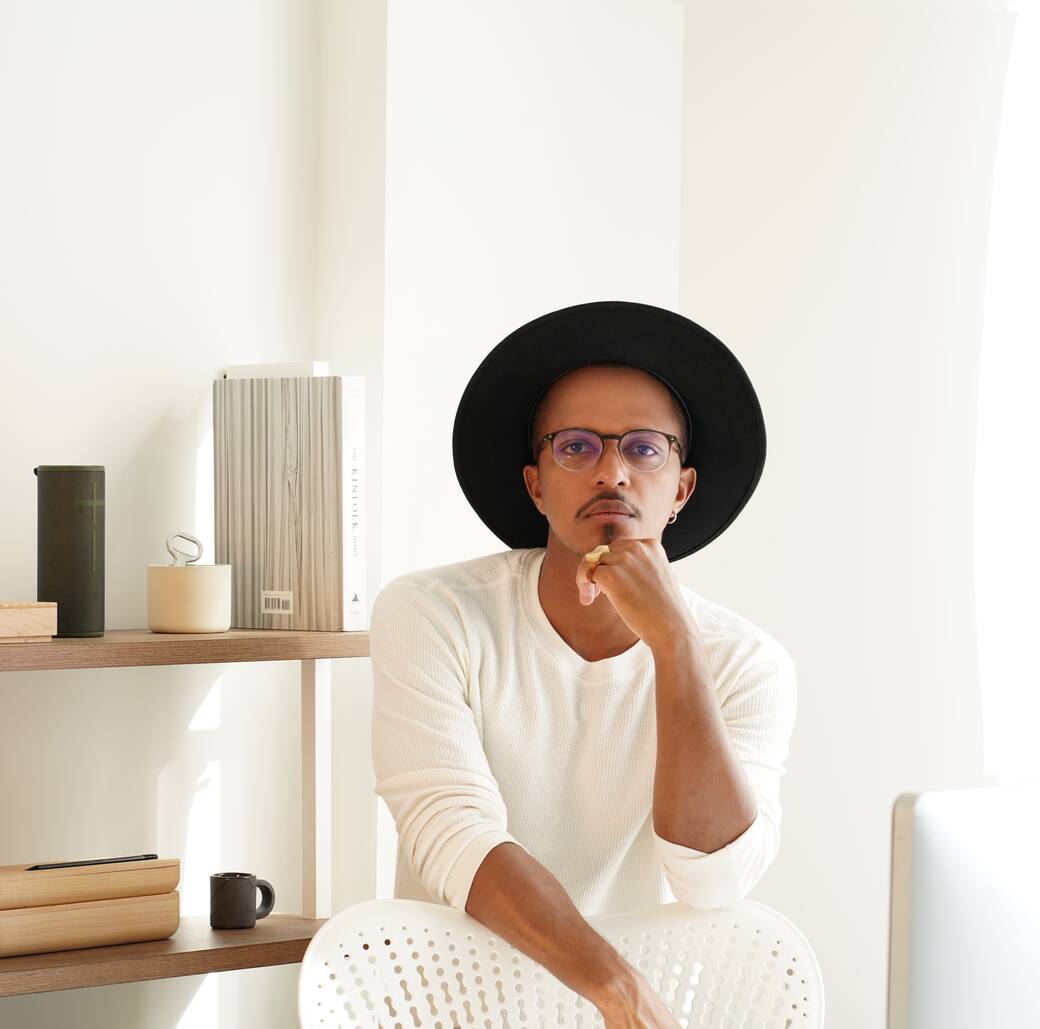profile / alumni / diversity / product-design
February 25, 2022
By Mike Winder
Images courtesy of Jeremiah Baker
ALUM JEREMIAH BAKER ON DESIGNING FOR TECH, ADVOCATING FOR CHANGE, AND THE RED THREAD OF AN ARTCENTER EDUCATION
Alumnus, former ArtCenter faculty member and industrial designer Jeremiah Baker (08 Product Design) has shipped multiple products for several of the world’s leading consumer electronics brands.
At Logitech, Baker worked as lead designer for the top-performing Ultimate Ears Boom line of speakers. At Samsung, he helped launch Level, the company’s first premium audio line. And most recently, at Google, he was instrumental in designing the future of wearable tech. He’s also been the recipient of multiple awards, including a CES Innovation Award, a GOOD Design Award, and multiple iF (International Forum) Design Awards.
Baker has also started his own company, Normal Objects, a collaborative and diverse collective of creatives designed to level the playing field. The company, which Baker refers to as "the underdog in the wholesale designer objects industry," is dedicated to small-batch production of “enduring and limited objects” that offer “timeless originals for a minimalist lifestyle.”
By any measure of accomplishment, Baker’s career since graduating from ArtCenter has been successful. Yet, as an African American working in industrial design for the tech sector, he describes the journey as rewarding but lonely. “I have more than twelve years tenure in the space, and have had many career successes,” says Baker. “And yet, at times, I still feel remarkably invisible.”
We recently sat down virtually with Baker to ask him about his time at ArtCenter, how he ended up designing tech products, and the importance of advocating for change in industrial design.

Have you always been interested in art and design?
As a kid I was more interested in art than playing sports. While everyone else was carrying a basketball or on some athletic team, I was carrying a portfolio filled with mixed-media art pieces. I spent my evenings painting. I’d also take machines—pencil sharpeners, calculators—apart to see how they worked. And then I’d remix the parts to see what new things I could make them do. I can’t say that I thought of myself as an artist or designer as a kid, but I knew I was different.
What kind of design or designers did you like when you were young?
I was first exposed to design through a sketch in Automobile magazine. Years later, I discovered that sketch had been created by a transportation designer that graduated from ArtCenter. In terms of my favorite designers, some of my favorites are Dieter Rams, Charles and Ray Eames, and Naoto Fukasawa.

How did ArtCenter prepare you for your career?
The ArtCenter experience in itself is a red thread. People who made it through all have that in common: They made it through. It takes risk, sacrifice, persistence and commitment. The friendships I formed while at ArtCenter have had a huge impact on who I am today. Some of my classmates became my closest friends. Others helped me land jobs or turned me on to opportunities that I wouldn't have known about otherwise. You can’t put a price on those kinds of bonds. And the rigor of the experience instilled in me a work and creative thinking ethic that I benefit from on a daily basis.
As a student, was it your ambition to design tech products?
I never sought out to become an industrial designer in tech. I always saw myself more in footwear or other lifestyle categories. But while at ArtCenter, I did an internship with Panasonic in Osaka, Japan. It was remarkable. It helped me turn a new leaf and influenced both the focus of my portfolio and my approach to design. After graduating in 2008—one of the worst times to graduate due to the economic collapse!—I spent a year doing freelance design projects for a variety of product categories. But then I found myself at Samsung. Since then, everything I’ve worked on has been in tech. I’ve shipped multiple products with several of the world’s leading consumer electronics brands—Samsung, Logitech and Google, just to name a few—where I’ve been able to work on everything from audio products to advanced hardware systems.

You’ve described your current undertaking as being an advocate for change in the industrial design profession. Could you explain that further?
What that means is that a great deal of my work is focused on taking action to get more underrepresented groups and perspectives in the field. It’s about disrupting limiting conventions. This undertaking has been inspired by my own experience. For me, knowing I’m pioneering in a space where African Americans are grossly underrepresented has been a lonely but rewarding journey.
What kind of challenges do African Americans face in industrial design?
We don’t all come into the profession with the same background or design literacy. And cultural differences definitely impact a person’s experience. It’s one thing to say that everybody is given the same opportunities—there are definitely many initiatives trying to ensure that—but designers on the playing field don’t all face the same obstacles. African Americans have had different starting points—culturally, economically—and that means that we arrive with different pressures. Sometimes those pressures make it hard to focus on the game. My goal is to help level the playing field.

Where do you get inspiration?
I get extremely inspired by nature. Nature is made up of highly complex systems that present so honestly and beautifully. There’s great design and intentionality in everything. There are beautiful forms and perfect functions. It’s all perfect and perfectly imperfect at the same time.
Where do you go to take a break?
Corporate design can often get rigid and dogmatic in its processes. So I like to go skateboarding. It takes the edge off, gives me invigorating energy and allows me to be extremely present. To prevent injury, it requires that I live in the moment. It's also a great way to see a city.

What reading materials are on your bedside table?
CEREAL magazine, a few issues of Kinfolk, and one of my all-time favorites: Super Normal: Sensations of the Ordinary by Naoto Fukasawa and Jasper Morrison.
What is your current obsession?
Currently, I’m spending a lot of time thinking about single-purpose everyday objects—those common objects we often overlook and take for granted. I love to dream up new ways to reinterpret them or give them new life.
What’s a superpower you’d like to have?
The power to remove limiting titles from design roles. I respect tenure but I think designers should have the liberty to experiment beyond their specialty or assumed skill. I love seeing an established graphic designer do industrial design. I’d love to see a fashion designer’s approach UX. Bringing disruptive point-of-views to established spaces can yield very unique product experiences.






